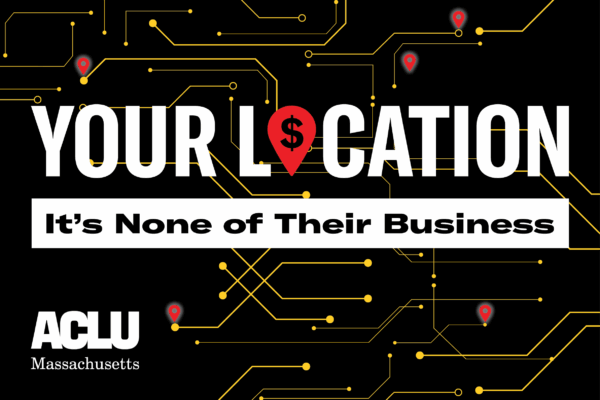
New poll: 92% of MA voters support this reform
Reproductive advocacy groups today launched “Your Location: It’s None of Their Business,” a campaign to ban the sale and trade of cellphone location information in Massachusetts.
Since the overturning of Roe v. Wade, this practice puts patients seeking abortion care in Massachusetts at risk of prosecution and harassment. Now, the ACLU of Massachusetts, Reproductive Equity Now, and Planned Parenthood Advocacy Fund of Massachusetts are calling on lawmakers to further protect patients and providers by passing statewide location data privacy protections.
“Our personal location information reveals the most sensitive and intimate things about each of us, and we all deserve to keep that information private,” said Carol Rose, Executive Director of the ACLU of Massachusetts. “Since the Supreme Court overturned Roe, states that ban abortion or gender-affirming care can purchase location data and use it to identify and prosecute people who travel to Massachusetts for health care. Massachusetts can, and should, continue to do all it can to protect patients, helpers, and providers by banning the sale of cellphone location information.”
According to a new ACLU/Beacon Research poll released today, 92 percent (92%) of Massachusetts voters support passing a law to prohibit the sale of personal location data. By a 3-to-1 margin, voters also believe the state—not individuals—has a responsibility to protect the privacy of people’s location information.
The ACLU, Reproductive Equity Now, Planned Parenthood, and a growing coalition of other organizations support the Location Shield Act (H.357/S.148), a bill that would prohibit companies from selling, leasing, trading, or renting cellphone location data. The Location Shield Act is sponsored by Representative Kate Lipper-Garabedian and Senator Cynthia Creem.
“When a patient is seeking compassionate abortion care, the last thing they should have to think about is anti-abortion extremists—thousands of miles away—purchasing and tracking their every move. Our privacy and right to access the health care of our choosing is absolutely priceless, regardless of what data brokers might think,” said Rebecca Hart Holder, President of Reproductive Equity Now. “As far-right extremists ramp up their efforts to prosecute patients traveling for abortion, this legislation to prohibit the sale of cellphone location data will be critical to shield patients traveling to and from abortion clinics in Massachusetts. We can create a firewall to protect patients and ensure that our private location data never falls into the hands of anti-abortion extremists.”
“When Roe v. Wade was overturned, Massachusetts took quick, decisive action to strengthen reproductive rights and provider protections. We must continue to fight together because we cannot guarantee patients' freedom to seek health care safely in our state when cellphone location data can be sold to dangerous anti-abortion actors,” said Dr. Nate Horwitz-Willis, Executive Director of the Planned Parenthood Advocacy Fund of Massachusetts. “Massachusetts has the opportunity to strengthen our reproductive health protections by preventing the sale of personal location data before it's used to criminalize anyone for seeking legal abortion care in our state."
Every day, companies collect and sell sensitive location data from cellphones, revealing where people live, work, seek health care, and more. Our cellphones constantly keep track of where we go; many apps collect location information even when they are not being actively used. Third-party data brokers are allowed to buy this personal information, repackage it, and then sell it to anyone with a credit card—without any federal or state laws to stop it.
This predatory industry puts millions of people across Massachusetts at risk. In the aftermath of the Supreme Court’s decision overturning Roe v. Wade, for example, journalists found that data brokers have continued to buy, repackage, and sell the location information of people visiting sensitive locations including abortion clinics. According to the new poll, 63 percent (63%) of Massachusetts voters are extremely concerned that states criminalizing abortion could use cellphone location data to prosecute people who travel to Massachusetts to seek care.
Massachusetts voters, according to the poll, are also concerned that cellphone location data can be sold to people seeking to cause harm such as domestic violence or stalking, foreign governments, and employers seeking to monitor employees or job applicants. The Location Shield Act—also supported by Jane Doe Inc., Fenway Health, and Transhealth, among other organizations—would protect essential privacy from the harmful sale of sensitive and private personal location information, while allowing companies to collect and process location data for legitimate purposes with user consent.
For more information about “Your Location: It’s None of Their Business,” go to: www.aclum.org/locationshield
For more information about the poll, conducted by Beacon Research, go to: https://www.aclum.org/app/uploads/drupal/sites/default/files/field_documents/your_location_its_none_of_their_business_-_public_deck.pdf
Stay Informed
Sign up to be the first to hear about how to take action.
By completing this form, I agree to receive occasional emails per the terms of the ACLU’s privacy statement.
By completing this form, I agree to receive occasional emails per the terms of the ACLU’s privacy statement.

